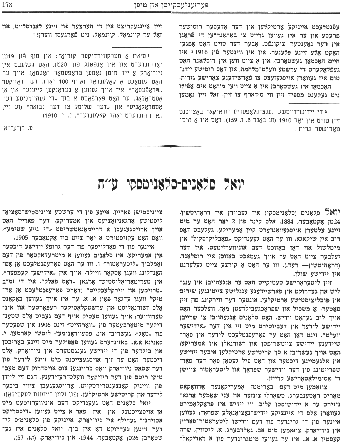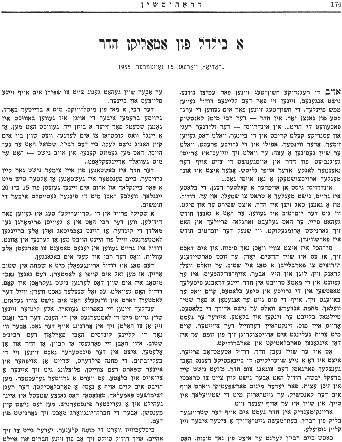Previous Page
|
Next Page

[Page 173]
Hochman published a few articles on the aforementioned subject in the Odessa Russian press. He was also prepared to address the issues in the near future. Death, however, interfered with all his plans, and in the winter of 1916 Chaim Hochman died while Russia was involved in World War I, and the Jews of Russia were subject to a number of Czarist decrees.
Hochman died at a time when no one could even eulogize him properly. May his name be engraved in the hearts of his fellow émigrés, and may he never ever be forgotten
YOEL SLONIM-SLONIMSKY
Yoel Slonim (Slonimsky) was born in Drohitchin on October 24, 1884. When he was two years old, his parents and he moved to the United States, living mostly in Chicago, where he completed public elementary and middle school, and then attended university. He also visited Russian (Drohitchin – ed.), where he studied briefly in Jewish schools.
He began his literary career in English, and published poems and public affairs articles in various English newspapers. Under the influence of his father, a follower of the Enlightenment, and a man educated in foreign languages and who loved Yiddish, Slonim started writing Yiddish poems and started publishing in the Yiddishe Velt [Jewish World] newspaper. Thereafter Yoel continued publishing his poetry in various Yiddish newspapers and magazines in the United States, and also wrote many critical articles about Jewish and general poets. He did a great deal to promote the Yiddish language and literature among assimilated circles.
Together with the prominent American attorney, Morris Rottenberg, Charles Zunser and Enny Shomer, Slonim organized a Yiddish club, where Yiddish was proclaimed the only national Jewish language. Slonim was one of the founders of the Yiddish Literary Association in New York, and together with A. Goldber, A. Litwin, Sarah Kestin and others, he was a co-founder of the Radical Zionist Association, one of the first Socialist Zionist organizations in the United States. The Association also published a quarterly publication, Die Naya Shtimma [The New Voice], which lasted for only one year until 1905.
One of the forerunners of the Jewish Artists Group in the United States, Slonim was a co-editor of the collection, Literatur 1, in which he published a treatise about Oscar Wilde; he did the same thing in the Yiddisher Kempfer [Jewish Fighter] in the nationalist Dos Folk [The People], in the collection Troymen un Virklichkeit [Dreams and Reality] (he wrote an article in that book about Edgar Allan Poe) and others. Slonim was also known as a journalist and first-class reporter and interviewer, and was active in the field as a contributor to Mehrheit [Majority] since 1906, and later to Tog [Day] under the pseudonyms of Lotshe Karmen, Y. Sanina, and others. He was especially popular for his reports and descriptions of Jewish gangsters in New York. As a poet, he excelled with his poems from New York City that express the powerful rhythm of the large metropolis, though they suffer from lack of focus. He published two books of poems and critical articles. (From Zalman Reisen's Handbook)
Yoel Slonim completed university with distinction, and served as an assistant district attorney for a while in New York. Some of Slonim's poems are publish in this Yizkor book. Yoel Slonim died on October 26, 1944 in New York (see p. 57).

[Page 174]
A LOOK AT THE OLD KHEDER
Radio, Warsaw, Nov. 15, 1935
If the rainy days in October are bothersome and unpleasant, for little Dovidel they were painfully unpleasant – they were the worst days of the year. Inside the classroom was the teacher flaying flesh with his whip, while outside the irksome rain and bitter cold penetrates the bones. Had it been summer, winter or even in freezing weather, Dovidel would have already found a solution: he would have snuck outside and spent his time running around the meadow or skating on the ice. Now, however, he couldn't even stick his nose out the door.
The rain continued outside without a break, and there was mud everywhere – you couldn't take a step anywhere. So little Dovidel had to stay in class the whole day; he remembered how good Yomtof was when he had a whole month off, living carefree and happy, without anything to worry about. But that vacation period went by quickly.
It was now only two weeks after Sukkot, though it seemed to him like months or years. He tried to find reasons to stay at home for a day. He wished he were sick, lying in bed with a fever. However, to his chagrin, he was healthy, and his mother sent him off to kheder. His tiny feet sank into the deep mud, and he could hardly move. He was wearing a pair of boots over his feet, since otherwise it would have been impossible to walk through the mud. Sometimes he stood there, sinking into the mud. Before he could pull out one foot, the other sank down into the mud. He barely managed to extricate himself from the swamp, but he was filthy and covered in mud.
He was close to school, and now Dovidel breathed easier. But he had a new problem: during the night, the rain flooded out the path to the kheder, and no ground was visible. Dovidel didn't have any time to think, and tried to find a solution. He would get a whipping for every minute he was late. He made his way into the river with his boots and got to the other side. When he arrived in class, the teacher glared at him, and Dovidel started shaking from fear.
He had been studying under this teacher since Sukkot, and he already had the opportunity to experience him on his shoulders and bones. The rebbe [teacher], a middle-aged man with a wide beard and large eyebrows, was known in town as an angry person. Everyone knew that any child who was in his class didn't taste honey from him. Under Shmuel (this was the rebbe's name), a student had to understand. Otherwise, he would be hit.
The classroom was a small room. Next to the window was an old table with a couple of benches seating 15 to 20 small boys, who followed the Bible text with their fingers. Dovidel had a bit of joy during those mournful days when one morning the rebbe asked the boys to bring lanterns since they were going to begin studying into the evening. Dovidel was ready to forget all the “crimes” that the rebbe had committed against him.
That day Dovidel was very happy at home since he was going to get his very own lantern. That whole afternoon his studies didn't bother him, and he was anxiously waiting for the evening so he could use his lantern. The children were finally liberated, and had their lanterns ready in hand. The rebbe was trying to keep them in order outside, but as soon as the boys left his class, they forgot him, the kheder and everyone else. They were now the bosses in the dark night. The boys started making a real racket, yelling and pushing each other. Then suddenly someone slipped into the mud, and everyone broke out in laughter. The poor kid got up with a bloody nose. The rain buzzed slowly, in a monotone. The whole town was covered in darkness, and no one was visible, but this didn't bother the young boys.
Gradually the group got smaller as each one went to his house; Dovidel also separated from his friends and hurried home. He now had the strong feel that he was
Previous Page
|
Next Page
This material is made available by JewishGen, Inc.
and the Yizkor Book Project for the purpose of
fulfilling our
mission of disseminating information about the Holocaust and
destroyed Jewish communities.
This material may not be copied,
sold or bartered without JewishGen, Inc.'s permission. Rights may be
reserved by the copyright holder.
JewishGen, Inc. makes no representations regarding the accuracy of
the translation. The reader may wish to refer to the original material
for verification.
JewishGen is not responsible for inaccuracies or omissions in the original work and cannot rewrite or edit the text to correct inaccuracies and/or omissions.
Our mission is to produce a translation of the original work and we cannot verify the accuracy of statements or alter facts cited.
 Drogichin, Belarus
Drogichin, Belarus
 Yizkor Book Project
Yizkor Book Project
 JewishGen Home Page
JewishGen Home Page
Yizkor Book Director, Lance Ackerfeld
This web page created by Lance Ackerfeld
Copyright © 1999-2025 by JewishGen, Inc.
Updated 13 Dec 2001 by LA

 Drogichin, Belarus
Drogichin, Belarus
 Yizkor Book Project
Yizkor Book Project
 JewishGen Home Page
JewishGen Home Page